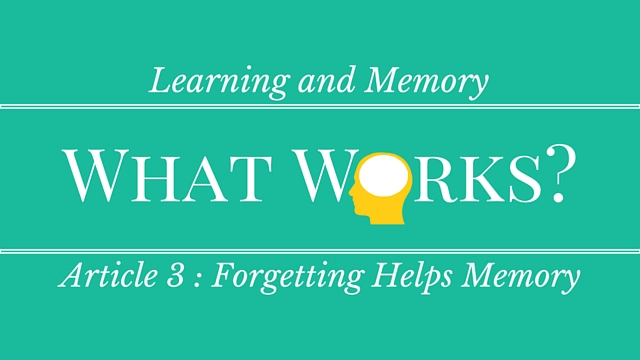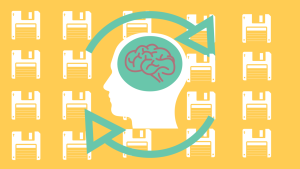Learning and Memory- What Works?: Forgetting Helps
Written by Sandie Barrie Blackley, Speech-Language Pathologist
Published on February 29, 2016
 We tend to think of forgetting as the enemy of learning, but the science of learning tells a different story. Forgetting is actually one of the best tools we have for remembering.
We tend to think of forgetting as the enemy of learning, but the science of learning tells a different story. Forgetting is actually one of the best tools we have for remembering.
How can forgetting help us remember?
The act of learning something, forgetting it and then remembering it again improves memory strength in that given subject. (Nunes & Karpicke, 2015).
Practice helps us transfer information into long term memory. So, forgetting is an important part of what makes practice work. It is only when we forget something during practice that we have an opportunity to figure out how to remember it the next time.
When given a “forgetting opportunity,” there are a few things research tells us we can do to improve the chances of remembering the next time:
- More practice.

- Use task-specific memory strategies or memory hooks.
- Use mindfulness methods to manage the emotional and/or physical factors known to degrade memory.
Previous research has indicated that the average student who is taught using one-on-one, mastery learning techniques perform better than 98 percent of students taught in group settings (Bloom, 1984). Lexercise is proven effective by providing one-on-one therapy with an expert therapist who customizes daily practice and utilizes these “forgetting opportunities.”
If you enjoyed this article, make sure you read Part One and Part Two of this series.
If you suspect your child has a learning disability, you can take one of our free tests here.
References
Bloom, B.S. (1984). The two sigma problem: The search for methods of group instruction as effective as one-to-one tutoring. Educational Researcher, 13 (6), 4–16.
Nunes, L. D., & Karpicke, J. D. (2015). Retrieval-based learning: Research at the interface between cognitive science and education. In R. A. Scott & S. M. Kosslyn (Eds.), Emerging Trends in the Social and Behavioral Sciences (pp. 1-16). John Wiley & Sons, Inc. [PDF]
Improve Your Child’s Reading
Learn more about Lexercise today.
Schedule a FREE
15-minute consultation


